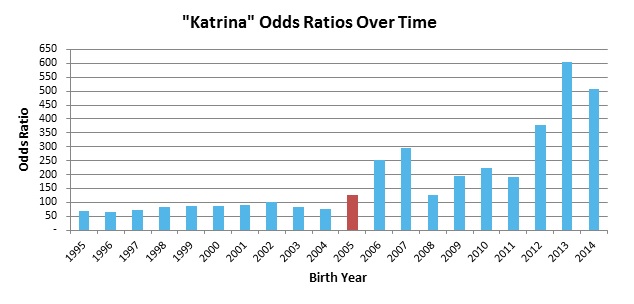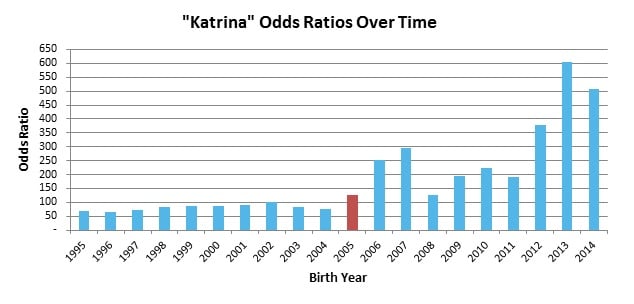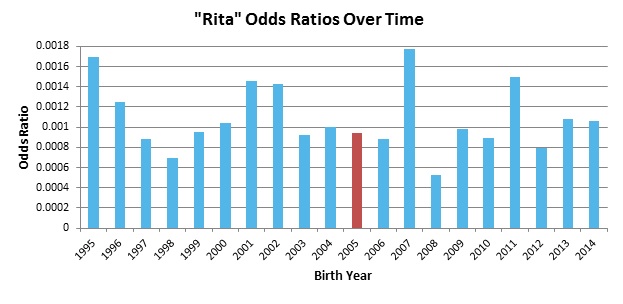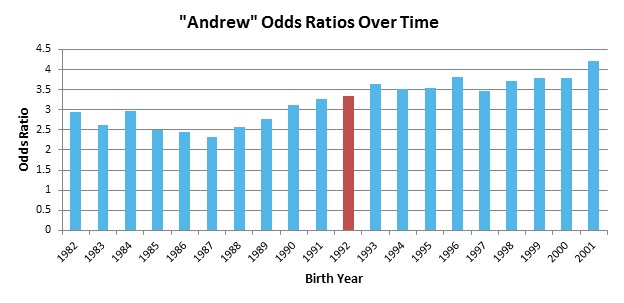Naming Odds Ratios: Could Hurricane Katrina Really Do That?
June 17, 2015 •Kevin Danielson

This August marks the 10th anniversary of Hurricane Katrina’s landfall in the US. From the Louisiana to Mississippi coast, this catastrophic storm caused over $75 billion in damages (the costliest on record to date) and around 1,200 reported deaths. The devastation was so widespread that the Federal Emergency Management Agency (FEMA) issued four major disaster declarations. And though the hurricane has long since ended, its legacy may not have.
Understandably, the name “Katrina” may leave a lasting impression on those in the impacted Gulf States after 2005. But could memories of this hurricane inspire relatively more people in the impacted Gulf States to name their daughters “Katrina”? Baby name frequencies from Social Security card applications are publicly available by state and year as far back as 1910, so let’s do some analysis.
Consider the impacted Gulf States defined as states declared major disaster areas by FEMA. Alabama, Louisiana, Mississippi, and Florida were the four major disaster declaration states for Hurricane Katrina. Summing the annual frequency of female baby names for these states and for the entire US, over time, could identify relative concentrations of baby girls named “Katrina.”
An odds ratio can approximate the odds that a newborn girl in the US will be named “Katrina.” The larger the odds ratio, the greater the likelihood that parents name their child “Katrina.” Paired two-tailed t-tests can provide inference for statistical significance of the odds of being named “Katrina” before vs. after the hurricane, at a 95% confidence level.
According to Social Security data, the name “Katrina” has been declining in popularity since the 1980s. No sweat. The odds ratio controls for total numbers of national and impacted Gulf State female babies, as well as total numbers of national and impacted Gulf State “Katrina” babies. The annual ratio calculation is a mouthful: the probability of a “Katrina” naming in impacted Gulf States multiplied by probability of a non-“Katrina” naming in non-impacted Gulf States, divided by the probability of a “Katrina” naming in non-impacted Gulf States multiplied by probability of a non-“Katrina” naming in impacted Gulf States.
The following chart presents the 20-year period surrounding Hurricane Katrina, up to the most recent year of data. The red bar suggests a distinct increase in the likelihood of “Katrina” naming occurs in the impacted Gulf States after Hurricane Katrina.

The average annual odds ratio for impacted Gulf State “Katrina” births after 2004 is about 290 compared to a 1995-2004 average odds ratio of 82. From 2005-2014, there is statistical evidence that parents in the impacted Gulf States are more likely to name their child “Katrina” after 2004.
Can this finding only be attributed to Hurricane Katrina or to hurricanes in general? For comparison, consider the similarly destructive storms: Hurricanes Rita, Andrew, and Hugo.
Though less devastating than Hurricane Katrina, Hurricane Rita occurred in the same season as Hurricane Katrina, impacting Louisiana and Texas. The average odds ratios before and after 2005 are 1,100-1,200 and are not statistically significant, suggesting no influence of Hurricane Rita on parents naming their daughters “Rita.”
 After Hurricane Andrew, another devastating storm on the scale of Hurricane Katrina, “Andrew” naming odds increase for Florida and Louisiana. But “Andrew” appears to already have been on the rise since 1988, and given that “Andrew” is a more common national baby name than “Katrina” (small odds ratio), increasing popularity due to the hurricane is difficult to assert.
After Hurricane Andrew, another devastating storm on the scale of Hurricane Katrina, “Andrew” naming odds increase for Florida and Louisiana. But “Andrew” appears to already have been on the rise since 1988, and given that “Andrew” is a more common national baby name than “Katrina” (small odds ratio), increasing popularity due to the hurricane is difficult to assert.
 The finding for Hurricane Hugo is fairly clear: there were no “Hugo” births in the impacted states of North Carolina or South Carolina from 1910 through 1992. (Note: Social Security Administration does not report name records where fewer than five individuals are born in a given year and state.) As Hurricane Hugo struck during the 1989 season, there is insufficient information to assert any impact on the name. So if you meet a “Hugo” from the Carolinas who claims to remember the hurricane, he’s likely lying.
The finding for Hurricane Hugo is fairly clear: there were no “Hugo” births in the impacted states of North Carolina or South Carolina from 1910 through 1992. (Note: Social Security Administration does not report name records where fewer than five individuals are born in a given year and state.) As Hurricane Hugo struck during the 1989 season, there is insufficient information to assert any impact on the name. So if you meet a “Hugo” from the Carolinas who claims to remember the hurricane, he’s likely lying.
Among these four storms, it appears that only Hurricane Katrina influenced the names of girls born after the storm. An odds ratio trend alone may not be substantial evidence to assert the increase in “Katrina” naming is due to Hurricane Katrina: the steep odds ratio increases in 2006 and 2007 could be coincidental anomalies. But the highs after 2007 are difficult to refute. These statistically significant likelihoods are reasonable evidence for correlation of Hurricane Katrina to “Katrina” births in the impacted Gulf States. Is causation implied? Maybe some Katrinas out there have theories.
For more baby name popularity over time, see the following query tool: US_Baby_Name_History.xlsx
Get Updates
Featured Articles
Categories
- affordable housing (12)
- agile (3)
- AI (4)
- budget (3)
- change management (1)
- climate resilience (5)
- cloud computing (2)
- company announcements (15)
- consumer protection (3)
- COVID-19 (7)
- CredInsight (1)
- data analytics (82)
- data science (1)
- executive branch (4)
- fair lending (13)
- federal credit (36)
- federal finance (7)
- federal loans (7)
- federal register (2)
- financial institutions (1)
- Form 5500 (5)
- grants (1)
- healthcare (17)
- impact investing (12)
- infrastructure (13)
- LIBOR (4)
- litigation (8)
- machine learning (2)
- mechanical turk (3)
- mission-oriented finance (7)
- modeling (9)
- mortgage finance (10)
- office culture (26)
- opioid crisis (5)
- Opportunity Finance Network (4)
- opportunity zones (12)
- partnership (15)
- pay equity (5)
- predictive analytics (15)
- press coverage (3)
- program and business modernization (7)
- program evaluation (29)
- racial and social justice (8)
- real estate (2)
- risk management (10)
- rural communities (9)
- series - loan monitoring and AI (4)
- series - transforming federal lending (3)
- strength in numbers series (9)
- summer interns (7)
- taxes (7)
- thought leadership (4)
- white paper (15)


